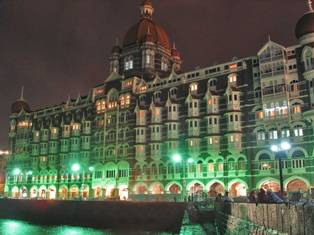Taj Hotel GM has no desire to enter room where his family perished
 Mumbai, Nov. 26 : The Taj Hotel here, one of the sites attacked by Pakistani-trained terrorists in November last year, still has someone who remembers that horrific incident and period, its general manager, Karambir Kang, a man whose family – wife and two sons -- was wiped out during the carnage.
Mumbai, Nov. 26 : The Taj Hotel here, one of the sites attacked by Pakistani-trained terrorists in November last year, still has someone who remembers that horrific incident and period, its general manager, Karambir Kang, a man whose family – wife and two sons -- was wiped out during the carnage.
Hotelier Kang says he would rather remember the family he lost, his wife, Niti, and their sons, Uday and Samar, as happy and vibrant, full of life.
Remarkably, after their deaths, he discovered that, on the day the militants struck, his family had visited the hotel photographer and posed for happy, carefree pictures. That is how remembers them now.
Now, he has no desire to enter the suite on the sixth floor where they perished.
"I have not entered that room – it''s not something I have done. Even in the aftermath I did not go in. I did not see the bodies. I refused to do this. To me, the last memories I want to remember are of them still alive," The Independent quotes Kang, as saying.
Twelve months after 10 Islamist militants swept ashore and laid deadly siege to the Indian city of Mumbai leaving more than 165 people dead and a nation stunned, the historic Taj Mahal Palace hotel is buzzing with the sound of workmen. Staffers say it is the sound of recovery, of the hotel coming back to life – the sound of defiance.
In the lobby of the 107-year-old building, Kang became famous as the man who worked without sleep to try and save his guests. Even after his family perished from the fire, trapped in their room – he had been speaking to his wife by phone until the very end – he refused to leave the hotel, insisting that he could help save the lives of others. At the time, his behaviour appeared remarkable, robotic even, but that was not the case.
Sitting in the hotel''s Sea Lounge, Kang says that, during those 60 terrible hours he received strength from his mother.
When he called her to say that commandos had finally broken into his family''s suite and found them dead, huddled together in the bathroom, his wife cradling one son, the body of the other lying beside them, she had told him he must do whatever he could for those still alive.
"I thought about it for a minute and I thought, ''Yes, that is the right thing do''," he says.
After the siege, many people told him that he should move away from Mumbai. He thought about it but decided to stay.
"If my family died here... I think it''s my moral duty to be here, maybe more than that – something deeper," he says.
"It''s important for me to oversee this task of rebuilding and see [the hotel] better than before. But also that I act in a way that makes my family, who are no longer, proud of me. Perhaps [I need] to redeem myself," says Kang.
"It''s not a question of forgetting. It''s not forgotten but we go ahead with our lives and we make sure this does not happen again," says Farhang Jehani, one of the owners of the Leopold Café, the first place that was attacked by the terrorists.
Additional Commissioner Deven Bharti, one of the policemen who have interrogated the sole surviving militant, Ajmal Kasab, the 21-year-old "highly motivated terrorist" whose trial is still ongoing, admits to the failure by the security forces, in particular a "failure of imagination".
"We never thought that 10 people from Pakistan would be landing in Mumbai and engaging five targets. I don''t think there''s anywhere in the world where militants have taken up five targets. The reorganisation and retraining has involved closer cooperation with the FBI and other international groups. "It has been a great learning experience," Barti adds.
Sebastian D''Souza, photo editor of the Mumbai Mirror and the man who rushed into the station and was rewarded for his dedication with a now-iconic image of Kasab, says the city rapidly returned to how things were, despite the carnage and the chaos. (ANI)